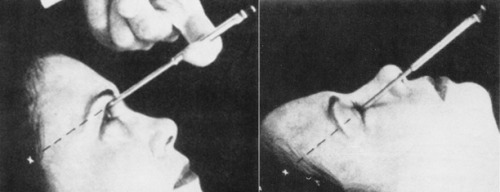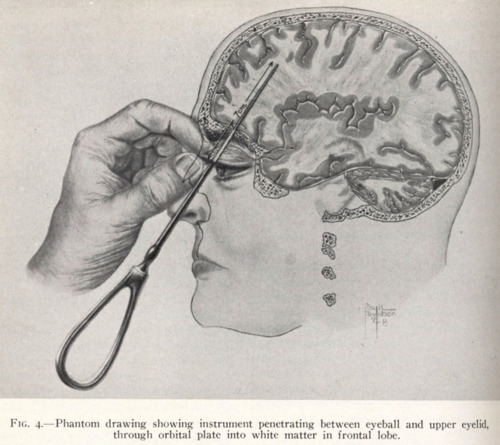Dr. Walter Freeman and the Ice Pick Lobotomy,During the late 19th and early 20th century many doctor
Dr. Walter Freeman and the Ice Pick Lobotomy,During the late 19th and early 20th century many doctors began to experiment with psycho-surgery, the use of brain surgery to treat mental illness. In 1935 a Portuguese scientist named Antonio Egas Moniz introduced the lobotomy, a procedure that won him the Nobel Prize in 1948. Moniz believed that by severing the connections between the frontal lobe and grey matter of the brain, he could calm a patient’s wild emotions and stabilize personality. In the world of psycho-surgery the lobotomy was a groundbreaking procedure that revolutionized treatment of the mentally ill. Eventually the lobotomy became a cure-all for almost any mental illness or developmental disorder. 40,000 were conducted in the US, another 17,000 in the UK. Tens of thousands more were conducted in mainland Europe, the Soviet Union, Japan, and the Commonwealth Nations. While many patients did benefit from the lobotomy, many more suffered terrible effects of the surgery. It was not uncommon for patients symptoms to worsen. Others suffered permanent brain damage, emotional and psychological instability, memory problems, and decreased cognition. About 5% of all lobotomy patients died from the procedure. One notorious case of a botched lobotomy was that of Rosemary Kennedy, sister of President John F. Kennedy.Rosemary Kennedy had many learning disabilities during her childhood, but regardless was a very intelligent and sociable young woman. In her late teens and early 20’s she suffered from occasional wild moods swings which psychologist would now diagnose as manic depression. An embarrassment to the Kennedy family, she was coerced into undergoing a lobotomy. In 1941, at the age of 23 she underwent a lobotomy at the hands of Dr. James Watts and Dr. Walter Freeman. The results of the lobotomy caused permanent brain damage that reduced her intelligence to that of a 2 year old. She had to be hand fed, bathed, diapered due to incontinence, and institutionalized until her death in 2005.Regardless of it’s negative consequences, physicians only focused on successful cases and continued practicing lobotomies. Originally the lobotomy was a complex procedure. Then in 1945 Dr. Walter Freeman, the same man who helped perform Rosemary Kennedy’s procedure, invented the transorbital lobotomy. Also called the “icepick” lobotomy, the procedure was very simple and crude. After administering an anesthetic, the surgeon placed an orbitoclast (essentially an icepick with depth increment markings) above the eye but below the upper margin of the eye socket. The surgeon would then tap the orbitoclast with a mallet to puncture the thin plate of the sphenoid bone located behind the eyes. The orbitoclast was then inserted 5 cm into the brain and rotated to sever the connections in the frontal cortex. The procedure was then repeated through the other eye.The icepick lobotomy was so simple that surgeons were not even required to perform the procedure. As a result the icepick lobotomy was a common procedure in mental asylums, then terrible hell holes run by people who had little or no credentials. Dr. Freeman himself performed icepick lobotomies on an outpatient basis from his office. It even became common for parents to have their children lobotomized for minor problems such as minor depression or even misbehavior. Eventually, health care professionals began to realize the negative effects of the lobotomy, with the procedure being recognized as dangerous pseudoscience by newer physicians. By the 1960’s lobotomy procedures began to decline in prevalence as it was replaced with new treatments such as therapy and administration of medications. By the 1970’s the lobotomy died out all together, and was banned in many countries. -- source link
#history#health care#mental illness#physicians#medicine#psychology#mental disorder#psychosurgery#lobotomy#icepick lobotomy#weird#oddities#bizarre



